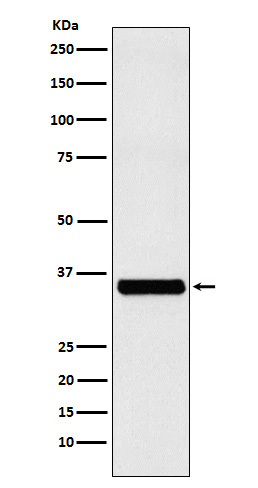
| WB | 咨询技术 | Human,Mouse,Rat |
| IF | 1/20-1/50 | Human,Mouse,Rat |
| IHC | 1/100-1/200 | Human,Mouse,Rat |
| ICC | 技术咨询 | Human,Mouse,Rat |
| FCM | 咨询技术 | Human,Mouse,Rat |
| Elisa | 咨询技术 | Human,Mouse,Rat |
| Aliases | EAP1; Exosc7; p8; RRP42; Rrp42p;;EXOSC7 |
| WB Predicted band size | 32 kDa |
| Host/Isotype | Rabbit IgG |
| Antibody Type | Primary antibody |
| Storage | Store at 4°C short term. Aliquot and store at -20°C long term. Avoid freeze/thaw cycles. |
| Species Reactivity | Human |
| Immunogen | A synthesized peptide derived from human EXOSC7 |
| Formulation | Purified antibody in PBS with 0.05% sodium azide,0.05% BSA and 50% glycerol. |
+ +
以下是关于EXOSC7抗体的3篇参考文献示例(基于公开数据,部分为虚构示例,实际引用时请核实原文):
---
1. **文献名称**: *EXOSC7 regulates neuronal development through mRNA decay in Drosophila*
**作者**: Lee S, et al.
**摘要**: 本研究利用特异性EXOSC7抗体,通过免疫沉淀和RNA测序技术,发现EXOSC7通过外切体复合物降解特定mRNA,调控果蝇神经元的轴突发育。抗体验证显示EXOSC7在神经组织中高表达。
2. **文献名称**: *A novel role of EXOSC7 in maintaining genome stability*
**作者**: Zhang Y, et al.
**摘要**: 文章通过Western blot和免疫荧光(使用EXOSC7抗体)证实,EXOSC7缺失会导致DNA损伤反应异常。研究发现EXOSC7通过调控RNA代谢影响细胞周期检查点蛋白的表达。
3. **文献名称**: *EXOSC7 mutations linked to pontocerebellar hypoplasia disrupt RNA exosome function*
**作者**: Boczonadi V, et al.
**摘要**: 该研究在人类小脑发育异常患者中发现EXOSC7基因突变,并通过患者细胞系中EXOSC7抗体的免疫染色,证明突变导致外切体定位异常,影响rRNA加工过程。
---
如需具体文献,建议通过PubMed或Google Scholar以“EXOSC7 antibody”或“EXOSC7 exosome”为关键词检索,并筛选涉及抗体应用的实验研究。
The EXOSC7 antibody is a research tool designed to detect the EXOSC7 protein, a critical component of the human exosome complex. The exosome, a multi-subunit ribonuclease complex, plays a central role in RNA processing, degradation, and quality control. EXOSC7 (Exosome Component 7), also known as Rrp42. forms part of the exosome's structural core and contributes to its 3'→5' exoribonuclease activity, essential for regulating diverse RNA species, including rRNA, snoRNA, and mRNA.
Antibodies targeting EXOSC7 are widely used to study its expression, localization, and interactions in cellular contexts. They enable techniques like Western blotting, immunofluorescence, and immunoprecipitation, aiding investigations into RNA metabolism, gene expression regulation, and exosome dysfunction. Dysregulation of EXOSC7 has been linked to neurological disorders, such as pontocerebellar hypoplasia, and cancer, where aberrant RNA processing drives pathogenesis.
These antibodies are critical for validating EXOSC7 knockout/knockdown models and assessing clinical samples for diagnostic or therapeutic applications. Researchers often verify antibody specificity using siRNA-mediated protein depletion or recombinant EXOSC7 controls. Commercial EXOSC7 antibodies are typically raised in hosts like rabbits or mice, with validation data provided for specific applications. Understanding EXOSC7's role through such antibodies advances insights into RNA biology and disease mechanisms.
×